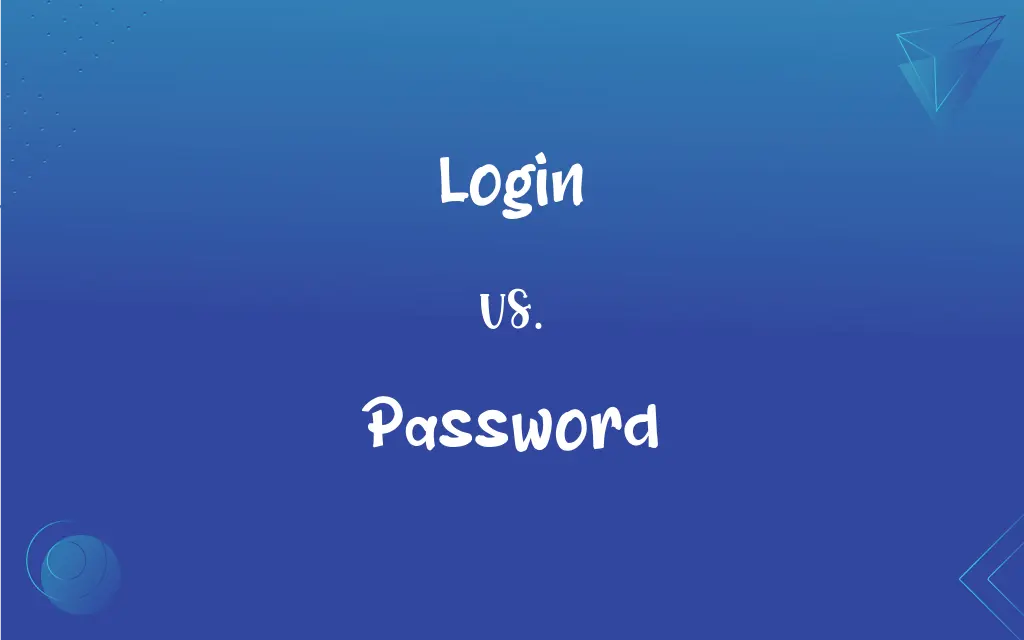Login vs. Password: What's the Difference?
Edited by Harlon Moss || By Janet White || Updated on October 5, 2023
"Login" usually refers to a combination of username and the process of gaining access to an account, while "password" is a secret word or phrase used to authenticate or gain access to a system. They work together in the security process but serve differen

Key Differences
"Login" is a term often used to denote either a user's account name or the act of entering into a computer system or network. It is a crucial component of accessing secured online platforms and typically requires a username or email and a corresponding password. "Password," on the other hand, is a unique string of characters that an individual chooses or is assigned to authenticate their identity to gain access to their login account. It acts as a key to the user's login and is intended to be kept secret to maintain security and privacy.
"Login" primarily serves as the entry point to an account or system. It can be a noun, referring to the account name or user ID, or it can be a verb, referring to the act of accessing an account. "Password," however, is essentially a noun, representing the secret code assigned to or created by the user, and its main purpose is to protect unauthorized access to an account, ensuring that the user attempting to log in is legitimate.
The term "login" emphasizes accessibility and user identification. It is the method through which users identify themselves to the system and request access. Without the login, access to system services is typically not available. In contrast, a "password" emphasizes security and authentication. It serves to confirm that the user is who they claim to be, and it safeguards the login from unauthorized access by encrypting the entry.
While "login" is related to user identification and access request, its efficacy is largely dependent on the security of the password. The login brings the user to the system’s door, and the password unlocks it. In the world of cybersecurity, the symbiosis between login and password is pivotal, with each having a distinct role in protecting digital information, ensuring that the interactions remain secure and confidential.
Comparison Chart
Nature
Can be a noun (username) or verb (action of gaining access).
Is primarily a noun.
ADVERTISEMENT
Purpose
Represents user identification and is the point of access to systems.
Provides authentication and protection to the login.
Security
Acts as user identification and is usually public.
Acts as a security key and should be kept secret.
Usage
Used to refer to both user ID and the process of accessing an account.
Used to authenticate the user during the login process.
Composition
Typically consists of a username or user ID.
Usually a string of characters, letters, and/or numbers.
Login and Password Definitions
Login
The act of gaining access to a computer system or account.
He had trouble during login and needed assistance.
ADVERTISEMENT
Password
A string of characters used to authenticate a user on a computer system.
Create a strong password to protect your account.
Login
The screen or page where one logs into a computer system or website.
The login page has a link for those who forget their passwords.
Password
A code that grants access to a locked system.
Enter the password to unlock your computer.
Login
The process of identifying oneself to a computer system.
Login to the website requires a username and a password.
Password
A secret word or phrase used to gain admission to a system.
Keep your password confidential to prevent unauthorized access.
Login
A username used to gain access to a computer system.
Your login must be unique.
Password
An element of security used to protect sensitive information.
Changing your password regularly enhances security.
Login
A combination of a username and password used to access a computer system.
Her login credentials are secured.
Password
A secret word, phrase, or sequence of characters that must be presented in order to gain access or admittance. Also called pass phrase.
Login
The process of identifying oneself to a computer, usually by entering one's username and password.
Password
A word relayed to a person to gain admittance to a place or to gain access to information.
Only if a would-be visitor knew the password du jour could he pass; the guards allowed no exceptions.
Login
A username.
Password
A string of characters used to log in to a computer or network, to access a level in a video game, and so on; archetypally a word#Noun but nowadays often an alphanumeric#Adjective string or a phrase#Noun.
A strong password has a mixture of lowercase and uppercase letters, numbers, and punctuation marks.
Login
(computing) A combination of a user's identification and password used to enter a computer, program, network, etc.
I've forgotten my login again.
Password
To protect with a password.
Login
(computing) The process of logging in.
Your login failed because you weren't connected to the office network.
Password
A word to be given before a person is allowed to pass; a watchword; a countersign.
Login
Misspelling of log in
Password
A secret word or phrase known only to a restricted group;
He forgot the password
Password
A means of confirming a user's identity.
The system verifies your identity by matching the entered password with the stored one.
FAQs
Does the password need to be strong to protect the login?
Yes, a strong password is essential for protecting the login from unauthorized access.
Does every login require a password?
Typically, yes. Most logins require a password for security purposes.
Is it essential to keep your password secret?
Absolutely, keeping your password secret is crucial for maintaining the security of your login.
Can login be used without a password?
It is possible in some cases, but it's generally insecure to have a login without a password.
Can the password be a combination of letters, numbers, and symbols?
Yes, a password can and should be a combination of letters, numbers, and symbols to enhance security.
Should you use different passwords for different logins?
Absolutely, using different passwords for different logins is recommended for enhanced security.
Can the login process include two-factor authentication?
Yes, many systems use two-factor authentication during the login process to increase security.
Can a password be retrieved if forgotten?
Typically, systems allow password reset or recovery options if a user forgets their password.
Is "login" a noun or a verb?
"Login" can be both a noun, referring to the user ID, and a verb, referring to the act of accessing an account.
Can "login" refer to a username?
Yes, "login" can also refer to a username or user ID.
Is the login generally public?
Yes, the login, or username, is usually public or easily identifiable, while the password should be private.
Does login identify the user to the system?
Yes, login serves as user identification to the system.
How do login and password work together?
Login identifies the user, and the password authenticates the user, working together to grant access to a system.
Is it recommended to change passwords regularly?
Yes, changing passwords regularly is recommended for maintaining login security.
What is the main function of a password?
The main function of a password is to authenticate a user and protect unauthorized access to login.
About Author
Written by
Janet WhiteJanet White has been an esteemed writer and blogger for Difference Wiki. Holding a Master's degree in Science and Medical Journalism from the prestigious Boston University, she has consistently demonstrated her expertise and passion for her field. When she's not immersed in her work, Janet relishes her time exercising, delving into a good book, and cherishing moments with friends and family.
Edited by
Harlon MossHarlon is a seasoned quality moderator and accomplished content writer for Difference Wiki. An alumnus of the prestigious University of California, he earned his degree in Computer Science. Leveraging his academic background, Harlon brings a meticulous and informed perspective to his work, ensuring content accuracy and excellence.































































